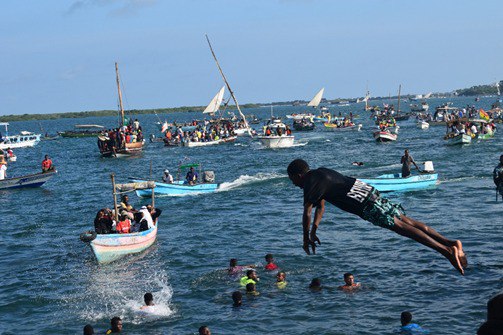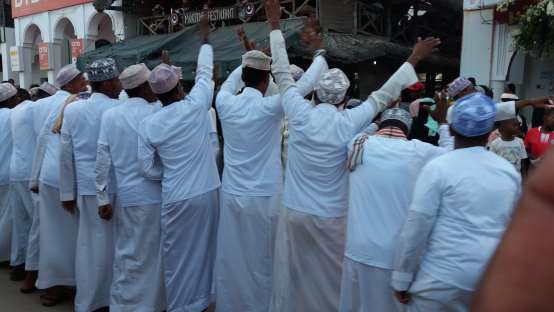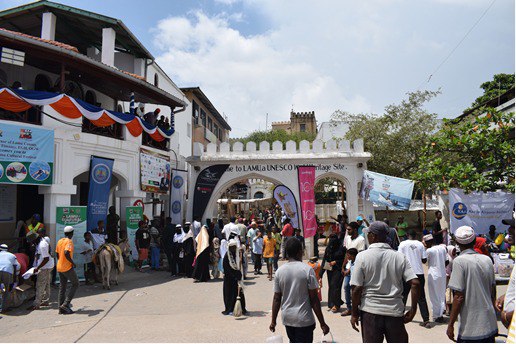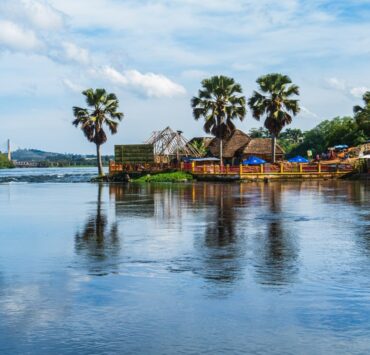The Shenanigans of Lamu Island Festival

Mr. Wanyama Ogutu is a scholar in the Master of…
The Lamu festival united long-term friends, unconscious enemies, determined fouls, distant relatives, and unlikable neighbors. It was also a memorable moment when a man touched the head of the snake without a deadly bite. The drummers dressed in white kanzus chanted, “Sherehe ni leo, “Sherehe imefika.” (The time for celebration is here). Others dressed in traditional African attire shouted in unison, “Lamu tamu! Karibuni wageni” (Lamu is beautiful, welcome visitors). The elderly wrapped themselves in kikoi and strolled along the seashore, chorusing, “Allahu Akbar, Allahu Akbar, La ilaha illa Llahu. Wa Llahu Akbar, Allahu Akbar wa lillahi l-hamd.” (Allah is the greatest, Allah is the greatest, there is no god but Allah. And Allah is the greatest, Allah is the greatest, and to Allah belongs all praise). Other men and women in black and white outfits, written “Sherehe Kisiwani” were moving from one household to another. They were distributing small placards written in the Arabic language with symbols of the Lamu eye and accompanied by children reciting, “La ilaha illa Llahu. Wa Llahu Akbar” (There is no god but Allah. And Allah is the greatest). Children chorused along vichochoros (narrow path), “As-salaam Alaikum Karibu Wageni” (peace with you welcome visitors).
They were young girls in deras (long free-flowing dresses) breaking their backs with electrified dance to ngoma za kirumbizi (Swahili drumbeats). Women in khangas’, lesos’, and buibuis joined young girls and left the crowd with showers of claps. Young husbands carried their children high on their shoulders to catch a glimpse of ngoma za kirumbizi. Some elderly men in kanzus pipped through the cracking walls, shaking their heads gently to the drumbeats. Women in hijab were taking selfies around the famous UNESCO sites. It never ended with drama when a bald man in baggy trousers raised a sharp machete shouting, “hatutaki washerati”, “washenzi nyinyi” (Fools, we do not want immoral people). He threatened to butcher foreign lesbians misbehaving openly at Mkunguni. Suddenly, a police officer sprang from the crowd and pointed the guns at the machete man’s head. The drumbeats stopped and the crowd wailed loudly. We scattered for our safety. The policeman pulled the trigger of the gun, and the man dodged the bullet. He disappeared from Mkunguni into the air like a ghost. The abominable act angered the spirit of Lamu Island.

The island was in a jovial mood when toads would run in the scorching sun. The week became alive with vibrant noise echoing as far as Mogadishu in Somalia to Cape Town in South Africa. The cock crow salute “Allahu Akbar!” was heard as far from east to west, north and south. The trumpet sound of siwa shook heavily the iconic architecture of Lamu lsland. The sound vibration blended with the rhythm of ngoma za Siu, sharp echoes of mashiri, and the piercing sound of nzumari (flute). I stood at the veranda to take a bath from the warmth reddish-orange rays of the sunrise. I saw the dhows marked with mapping floral motifs weregliding smoothly across the water with passengers on board. I wondered if l was watching a movie, or reality show, or an AI movie on TikTok. The crowd of young boys was floating and hanging on top of dhows haphazardly. The dhows appeared to sink deeply in the middle of the deep sea and then resurface with the young men in a celebratory mood. People watched from a distance of the Island and responded with jubilation applause, blowing nzumari and chanting “Lamu Tamu! Karibu Lamu!” (Lamu is sweet welcome). Some women wailed, calling their sons’ names loudly. Their cries were valid because they were a potential feast for dangerous sea creatures like blue-ringed octopus, stonefish, cone snails, beaked sea snakes, pufferfish, flower urchins, and lionfish. Neither of the single young boys was hurt or injured in the shenanigans at the deep sea.
I watched a group of young men confidently jumping into the deep sea like a log of coconut trees. A boy emerged from the water skillfully riding on the back of the tiger shark while raising the Jamaican flag. Everyone from the island celebrated with a shout of laughter. The shenanigans were so deadly, like a fly following a corpse to the grave. I recalled my childhood in the village when I dived into a river and was bitten by a black snake. I also remember escaping the cruel jaws of a crocodile. I still carry the wounds on my neck and hands from deadly experiences in the waters. I came to learn that diving shenanigans were part of the Lamu festival competition. The diving competition was packaged with heavy monetary rewards.
l also observed young boys playfully speeding boats with children laughing on board. Other race boats approached the beach at high speed, dropping off passengers and leaving splashes on the water. In one instance, the other boy lost control and his boat capsized in the deep sea. No one ran to rescue the drowning boy. Within a minute, the boy resurfaced skillfully from the sea, turned the boat, and sped off. The sky was filled with the noises of aircraft above the sky. The aircraft were seen frequently taking off from a nearby airstrip. Passengers were carrying luggage disembarked from docking ships at the Lamu port. A few dhows were floating on the calm sea with people scrolling and checking messages on their phones. Some visitors answered their buzzing calls while others were escorted to their hotels. There was a heavy presence of the navy military patrolling the sea. Troops of the navy armed with guns were speeding their boats towards the vanishing forest of mangrove trees.

I bumped into another hijab lady in a reflector jacket written “Usalama” (security). She created a soprano noise broadcasting, “Chunga Usalama Wako” (mind your safety). She was accompanied by a group of young boys, rumbling drumbeats. The sounds of drumbeats were so loud to the point they scared donkeys carrying crates of sodas. The donkeys stampeded in different directions, leaving broken crates of sodas and coconut brew. I followed the lady to the open field of Mkunguni. Indeed, whenever the drum rumbles, it must be accompanied by the dancer. The drumbeat persisted loudly until there was an electric crowd of people rushing to Mkunguni. A multitude of white and black people dressed in vibrant kanzus, kikoi, leso buibuis walking up and down, talking in high tones. Some were quarreling along vichochoro reclaiming their spaces. Some stood upstairs in the nearby buildings to catch a glimpse of persistent drumbeats.
The women at Mkunguni displayed several tables of appetizing burnt cakes, acharis (cookies), donuts, samosas, homemade chocolates, mkate wa sinia, and roasted goat meat. A crowd of visitors stood at the tents to enjoy kahawa tungu, and chai ya mwarabu. Everyone was sweating heavily and fanning themselves with newspapers. They simply grabbed barafu ya mkwaju (cold baobao fruit juice) to cool their body temperatures. Unexpectedly, a ball from nowhere knocked the table full of mkate wa sinia (burnt cake). It all scattered on the ground. The Swahili lady quickly picked pieces of mkate wa sinia from the ground. Then her son picked them from the plate and dropped them in his mouth. The boy caught my eye and offered a piece of mkate wa sinia. I smiled back and dropped a piece into my mouth too. Suddenly, his mother sprang up furiously holding a plate of mkate wa sinia, and she knocked my head. She demanded payment for missing burnt cakes. I quickly reached into my pocket and pulled out a dollar to avoid embarrassment. But the nagging woman held tightly to my neck and threatened to drown me in the sea. A muzungu (white man) standing behind me cooled the situation by graciously handing her ten dollars. The woman smiled and went back to bake more mkate wa sinia.
The afternoon was more lively than midday when the cripple would walk in the shining moon. The day concluded with the rumbling sounds of ngoma za siya (Swahili drumbeats) and the melodious sound of mzumari (Swahili flute). The visitors were loitering along the beaches of Lamu Island. They painted the island in a colourful landscape and people walking in pairs. Some were taking selfies against the sailing dhows. The sailing dhows gave a reflection of the sunset shadows of couples cuddling each other in the sea. The foreigners were half-naked on their hotels’ rooftops, reclining on their beds. The sound of broken glass and laughter pierced the noisy evening. A cloud of puffing smoke escaped from the windows of the hotels. Some visitor stretched their legs on the adjusted bed, listening to soft, melodious music. They shook their head gently to the drumbeats while shaking their bellies. Other visitors joined the men in white kanzu performing ngoma za barazani (Swahili music).
The evening was made bright by sparkling lights from hotels, restaurants, and county government public lights. It brightens the vichochoros to keep off the hovering thieves and rappers. The families and friends gathered at one point, feasting on the delicious Swahili dishes. An elderly person in a kanzu sat in one corner, engaging in an endless conversation. A mother in hijab holds their daughter’s hands tightly in fear of foreign predators. Women and daughters of Lamu island were hawking at children with special attention. The naughty children were impatiently running after men riding on the donkey. Some children were running after dhows, and others were following the drummers. Many horrified stories were reported of missing children without a trace. Small girls were left nursing their pregnancy, and husbands shed tears for losing their wives. That night ended with a mother wailing vociferously, My Son! My son!. His only son was helpless on a speeding boat heading to the northern part of Mogadishu.
What's Your Reaction?
Mr. Wanyama Ogutu is a scholar in the Master of Arts (Fine Arts) program at Kenyatta University. He is also a practicing visual artist specializing in drawing, painting, and sculpture within, Nairobi, Kenya. He focusing in Painting with its’ philosophy, education and extension to Africa contemporary Art. Most of his artworks focus on interaction, environment, and education. Wanyama has a passion for fine art research; its philosophy, development, and relevance. He writes on profound academic topics, where he has presented and published in international journals and conferences around the world. He is a consultant in innovation and creative strategy on issues affecting our society. He is currently a part-time teacher at some TVET institutes within Nairobi.












